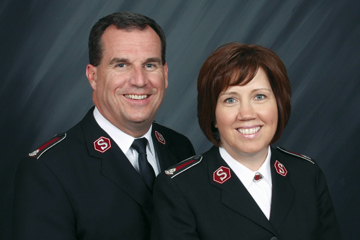Tell us about your journey as an officer. What inspired you?
Leadership has been a lifelong journey. I think back to when I was nine years old and my corps officer ran a Sunday afternoon junior soldiers' club. When she cancelled it in its third year, I drew up a petition for all the other junior soldiers to sign so she could keep the program going. She took me to her office and said, “I can do this if you help me.” That's where I first had a sense that my actions could make an impact.
Later, I went to university to pursue a bachelor of science degree with the intention of heading to medical school. But during university, my wife, Tracey, and I felt God's call to be Salvation Army officers. In our first appointment, we worked with Mississauga Temple, Ont., to daughter a new church. We went from there to Jackson's Point, Ont., which showed us the joys of small-town ministry. Divisional and territorial youth work broadened our perspectives and allowed us to interact with diverse expressions of the Army. Those experiences made it easier when I took on my current role as chief secretary.
What are your guiding principles?
A number of years ago, I completed the Arrow Program, a Christian executive leadership development course that helped deepen my walk with God and gave me important tools for leadership. I try to live by the Arrow motto: Being led more by Jesus to lead more like Jesus so that others may be led to Jesus.
When I was at the International College for Officers in 2003, I also did a 20-minute “Your Life Journey” reflection. Looking in the rearview mirror of ministry, I began to see the theme of the privilege of being “partners in the gospel,” building on Philippians 1:3-5. My wife and I have adopted this as a model for our ministry, a leadership engaging with partners in the gospel in our diverse appointments.
What's the toughest thing about being a leader in the Army?
The biggest challenge is organizational change. There has been a significant postmodern shift in culture, and the Army needs to respond. The first step is to create the urgent sense that change is needed without making people feel as though the sky is falling. For example, 40 percent of active officers in our territory will retire within a decade. How are we attracting and keeping the new generation of leaders?
We must be honest and transparent about our challenges. There is the impression that we are always an Army “on the march” or an Army that's “got it all together.” I think that is a legacy of our hierarchical, militaristic structure. But it's an increasingly dated style of leadership. What my grandfather or my father needed to hear from leadership is far different from what my son needs to hear from leadership.
 Colonels Floyd and Tracey Tidd
Colonels Floyd and Tracey Tidd
I ask myself two questions. First, how will this decision impact the mission outcome of The Salvation Army on a short-term and long-term basis? What are we trying to achieve? For hockey fans, I use the Wayne Gretzky analogy: Does this decision move us to where the puck is going or is it where the puck is right now? Will this decision position us for the future or is it a short-sighted, knee-jerk reaction?
Second, who is affected by the decision both positively and negatively and how should that affect the way I respond? I need to own the repercussions of my decisions. Army leaders must regularly evaluate our decisions in light of our core values, both personal and organizational.
What advice would you give to aspiring leaders?
I've been reminded in my own leadership journey that most things aren't as critical as they first appear. I'll give you two extensions of that thought. William Booth wrote to his daughter Evangeline when she was first sent as a national commander to the United States. His advice? “Don't watch the waves; watch the tide.” In essence, don't worry about the small things, but ask: Is there a bigger trend here that I need to be aware of?
The second example comes from my hermeneutics professor at Tyndale University College and Seminary. She said, “Learn to live with tension.” In musical terms, the chord does not always have to resolve at the end of the piece. As my professor pointed out, the Western mindset desperately tries to solve everything, but some things we must leave with God. A leader's job is to help other people live in the tension.
How do you stay spiritually grounded?
In his book Too Busy Not to Pray, church growth guru Bill Hybels writes, “Beware the barrenness of the busyness in leadership.” The busyness can consume everything, and sometimes the barrenness doesn't become apparent until it's too late. It's important to stay in relationship. Leadership can be very task-oriented, so I try to build connections with people.
Mentoring was a great support as I moved into a leadership role where I had to make tough decisions. Promise Keepers describes three relationships that I think every leader needs. First is a “Paul,” someone who can mentor and coach me along, just as Paul did with Timothy. Second, I need to look for the “Timothy” that God has placed in my sphere of influence, someone I can mentor. Lastly, I need a “Barnabas,” someone who is at the same point in the journey, someone that I can just be myself with.
How has your leadership style changed?
My approach to leading has become much more listening-focused. Even if I have the right answer, nobody wants to hear it until they've been heard. My answer doesn't matter if people don't feel as though I really understand their viewpoint.
As a leader, I've also realized that I'm not going to get it right all the time. I'm not going to meet everybody's expectations, but I have to be true to myself. In the end, it comes back to integrity. Being true to who I am will help me lead God's people to where he intends them to go.
When you first took office as chief secretary, you emphasized discipleship. Have we made progress in this area?
This must continue to be a priority, although measuring progress is not a simple exercise. It is encouraging to see a growing number of small groups and persons involved in Bible studies. A fresh resource for soldiership preparation is in development and will be released in the near future.
Where have you seen growth?
I see a greater involvement of Salvationists in service and community engagement in the neighbourhoods in which they live and worship. It is a natural response to deepening discipleship. I urge every Salvationist to embrace opportunities to advance the mission of The Salvation Army. Find your place of ministry and continue to serve God joyfully.
“My God is More Than Able … ”
Colonel Tracey Tidd will assume a new appointment as territorial president of women's ministries in the Australia Southern Territory. She shares some parting thoughts with Salvationist.
How have you seen women's ministry evolve?
The territory has chosen seven priorities in line with the General's international vision. The women's ministries department is focusing on spiritual renewal, leadership development and integrated mission ministry. Our first project on women's lay leadership development is scheduled for the fall of 2013 and will be webcast across the territory. It will be followed by leadership development for women corps officers in 2014-2015.
We're ministering with women of diverse backgrounds in terms of their family situation, work, education and income level. Many women are trying to balance work and family and want to spend the little free time they have doing something of value. They want something that meets their needs before they commit. There is no one-size-fits-all category.
Ministry with women will look different in each setting. It's about building relationships with women inside the corps as well as in the community. It's about looking at women's individual gifts and how they can be used, including what they bring from their professional lives. Programming has increasingly become short-term and flexible to accommodate busy schedules.
What will you miss most about Canada and Bermuda?
I'll miss connecting with people around the territory. I'll miss my two children, daughter-in-law and elderly parents. I will miss those with whom I have shared as “partners in the gospel” in my role as territorial secretary for women's ministries. My husband and I have journeyed with so many through our various appointments in corps, youth and administrative work. I have treasured listening to people's stories, sharing in their journeys and praying with them through life's ups and downs.
What unique opportunities are you anticipating in Australia?
I look forward to seeing new expressions of The Salvation Army and responding to local needs and opportunities. I anticipate the joys of working alongside territorial headquarters staff, divisional directors of women's ministries and women of the Australia Southern Territory. Over these last 27 years as an officer, I have built friendships and connected with women who have prayed for me, encouraged me and challenged me. Through it all, God has always provided everything I have needed and more. I am reminded of the song, “He is able, more than able, to accomplish what concerns me today.” As I make this transition, I go in confidence, claiming Philippians 1:6 that he who began a good work in me will carry it to completion until the day of Christ Jesus.
Feature photo: iStockphoto.com/bowie15










Leave a Comment